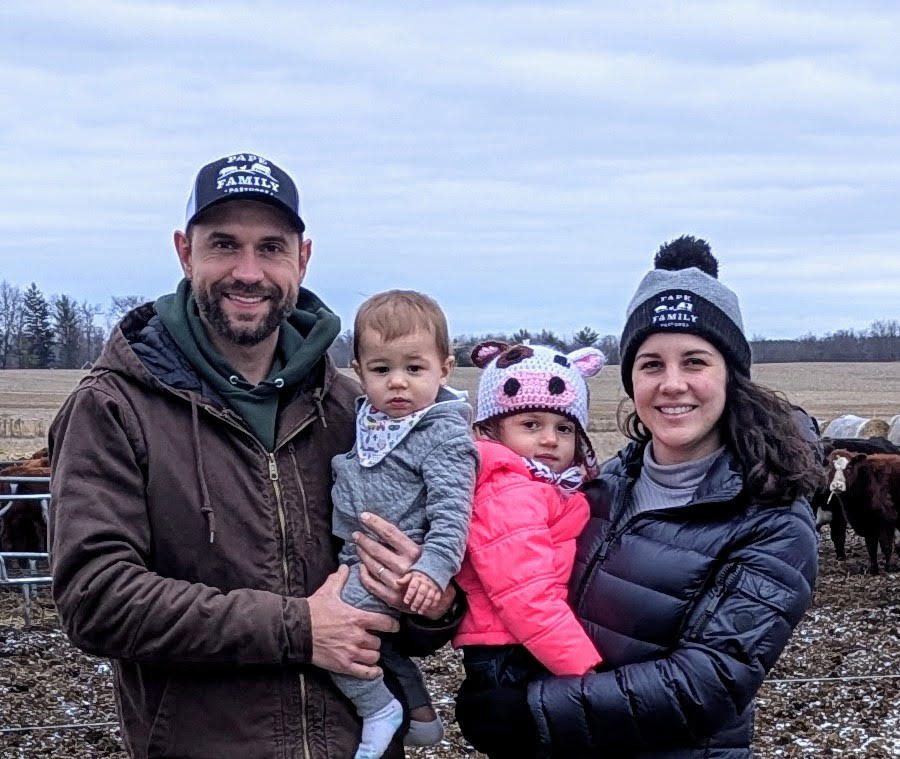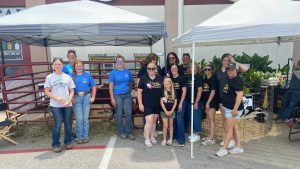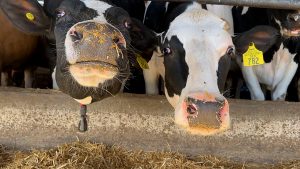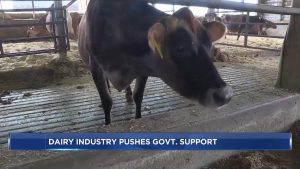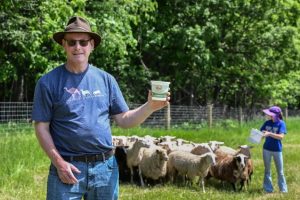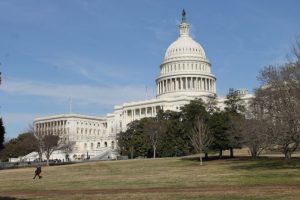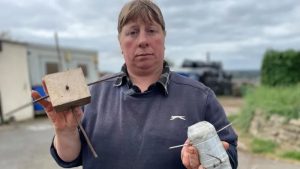
Wisconsin farmers are among a growing number of Americans facing debt after the Trump administration’s freeze on federal contracts. It’s a ‘kick in the shorts’ to the farming community, according to one local farmer.
Aaron and Erin Pape dreamt of having a farm—to help the land, produce healthy animals, and raise a family.
The Marinette County couple began to realize their dream about eight years ago, when they bought a 30-acre property in Peshtigo.
“Erin and I had lots of reasons why we wanted to farm,” Aaron said. “In addition to dreams of land restoration, securing healthy food, and working together on a business, we had an idyllic vision of raising a family close to the land.”
Pape Family Pastures has now expanded to 300 acres and is a diversified grazing farm with three main pieces. The Papes raise 100% grass-fed beef that is sold to consumers, as well as organic pastured chickens, and custom-graze dairy heifers for other farmers.
Wisconsin farmers are bracing for impact
Across the country, farmers like the Papes are in insecure economic positions, as they try to navigate a barrage of executive orders from the Trump administration in an already strained rural economy.
“The government is being hit with a sledgehammer right now and projects are being smashed and departments closed at the drop of a hat,” Aaron said. “It’s way too chaotic to respond to—it’s making it difficult to react.”
The Peshtigo farmer said he did not vote for Donald Trump. “Trump very much sold farmers a false bill of sale.”
“There was all of this talk of ‘farmers are the backbone of America’—when in reality, there are a number of things that he’s done in this very short time that have been and will continue to be detrimental for farmers.”
Farm advocacy groups in Wisconsin are hearing about a myriad of worries from their members.
“Everybody’s been dazed in terms of the amount of impact that’s occurred in the last few weeks and then just really trying to figure out their next strategy,” said Julie Keown Bomar, executive director of the Wisconsin Farmers Union, the second largest agriculture organization in the state.
Keown Bomar said billions of dollars are at stake—not to mention the livelihoods of thousands of farming families. A couple of the biggest threats affecting farmers are a freeze on US Department of Agriculture (USDA) programs, and a near-shutdown of spending by USAID, which buys about $2 billion of products from US farmers every year.
Compounding that is President Trump’s push for high tariffs on some of the nation’s most important trading partners, which is widely expected to result in retaliation from other countries in ways that will hit farmers hard. For example, the US imports much of its fertilizer, so increased tariffs on steel could lead to retaliatory tariffs on fertilizer, sending prices soaring for Wisconsin farmers.
Keown Bomar said nations around the world are already reacting. “When we leave a void in the international trade market, it’s quickly filled by other countries,” she said. In 2020, Trump’s trade war with China temporarily closed off a significant market for Wisconsin soybeans. By the time the dispute was resolved, some Chinese buyers had already found new suppliers in Brazil.
“Canada has already cut deals with other countries to make up for even the threat of a tariff that came out of the administration a few weeks ago.”
“The chaos and uncertainty is very worrisome,” said Aaron. “We just don’t know what the future is going to hold.”
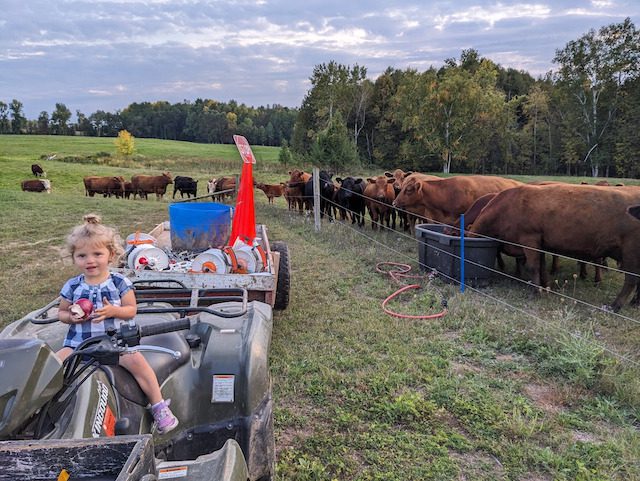
At Pape Family Pastures, this fence and water system were cost-shared through a previous NRCS EQIP contract. Photo courtesy Pape Family Pastures
Grateful for conservation programs
Aaron said the growth of Pape Family Pastures “is very much in large part” due to the assistance from a Natural Resources Conservation Service (NRCS) program, which is under the USDA.
The program is called the “Environmental Quality Incentives Program,” or EQIP. It’s the NRCS’s flagship conservation program that helps farmers, ranchers, and forest landowners integrate conservation practices into the work they do on their lands. The government’s Inflation Reduction Act (IRA), signed into law by former President Joe Biden, funds EQIP with the goals of helping conserve ground and surface water, increase soil health, reduce erosion, and improve habitats—all of which help ensure the land will continue to be productive for generations to come.
“We’re trying to do good things to provide good food for the American people and to take care of our local environment while we do it,” Aaron said.
EQIP provides technical and financial help to local farmers who commit to conservation practices.
“We’re able to get assistance to do the types of farming practices we think are best for the land and allow us to make a profitable business,” Aaron said. “In return, we’re taking worn-out cropland that’s been highly eroded, causing water quality impacts, and we’re putting in quality perennial grass.”
He calls it a “win-win program.”
“I value the partnership with NRCS that’s allowed us to grow our farm and provide quality food and heifers to customers.”
The “kick in the shorts”
As the Papes were preparing to rent some more acreage, they decided to get an update on their latest EQIP cost-share reimbursement contract that they’d signed last spring.
What they got back in an email from their local NRCS office was unsettling.
“They replied back they owed me about $30,000, but there was some disconcerting language,” Aaron said. “‘We’re unable to pay on the contract at this time and don’t know when funds will be made available because it was contracted as part of the Inflation Reduction Act. Any further practice implementation is at my own discretion.’”
“That was a kick in the shorts,” Aaron said
A cost-share contract essentially pays the farmer back after the contracted work is done. In Aaron’s case, it was going to help cover seed, a watering system, and fencing.
“It’s too late, it’s installed, the money is spent—there’s no going back,” Aaron said in frustration.
“It’s because the President decided he didn’t want to spend the money that was allocated by Congress two years ago toward these contracts.”
This leaves some farmers with the threat of insurmountable debt because a funding partner reneged on their part of the deal.
“Thirty-thousand dollars might not be a lot to some, but I need that money to operate,” Aaron said. “I was counting on that money to operate the farm this year. If I don’t get paid, I have to go borrow that money.”
And borrowing only compounds problems. “If I have to pay 8% interest on all of the money I’m borrowing, that’s going to negatively affect my finances for the year,” Aaron said.
“I don’t expect government to take care of me or to save me. But also what I don’t expect is the federal government to actively put roadblocks in the way of my success.”
The impact could stretch into all kinds of lending and banking issues around the country, according to Lincoln County dairy farmer Hans Breitenmoser.
“Think of how many bankers are out there right now scrambling and looking at new loans with a great big question mark,” Breitenmoser said on UpNorthNews Radio. “It puts a lot of pressure on these banks that are serving rural America and the loan officers that are doing the work out there because they don’t know what’s going to happen tomorrow.”
When farmers struggle, we all struggle
Aaron said not everyone may be personally feeling the effects of the abrupt freezes right now, but they will. When farmers struggle, consumers feel it at the grocery store.
“All of these different policies that Trump’s been pushing have impacts on the cost of production on the farm level,” he said. “Then that’s going to get passed down the value chain to the grocery store shelf at the end of the day.”
Aaron added that he expects the government to make decisions in a thoughtful, procedural manner, but right now, the only constant is chaos.
“I’m a longstanding Christian and have conservative moral and social values, but at the end of the day, I understand competency in government is a good thing.”
“This is not hippy-dippy stuff we’re doing here—we’re farming,” he said. ”We’re raising cattle for butcher, we’re raising cattle for milk, we’re raising chickens for butcher—this is not some ‘liberal nonsense.’”
You can now read the most important #news on #eDairyNews #Whatsapp channels!!!
🇺🇸 eDairy News INGLÊS: https://whatsapp.com/channel/0029VaKsjzGDTkJyIN6hcP1K
